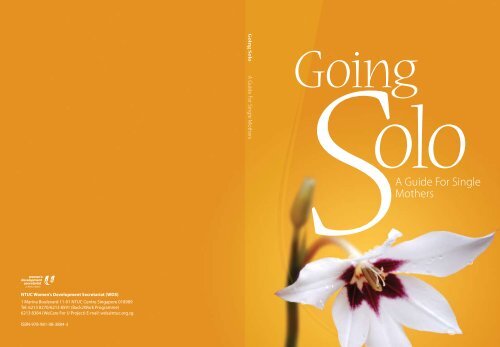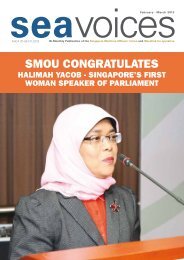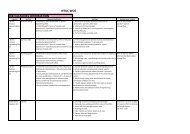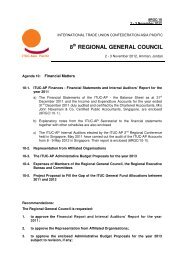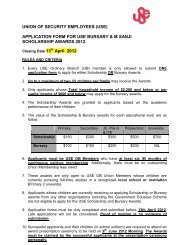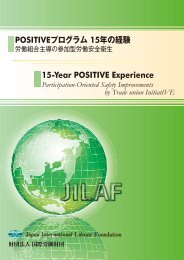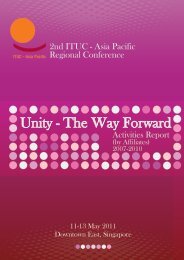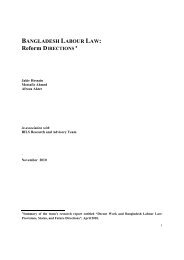A Guide for Single Mothers - NTUC
A Guide for Single Mothers - NTUC
A Guide for Single Mothers - NTUC
- No tags were found...
Create successful ePaper yourself
Turn your PDF publications into a flip-book with our unique Google optimized e-Paper software.
Chapter 3What Are Your Legal Rights?78 Family Court81 The Law Society In Singapore99 Acknowledgments3© Copyright 9 September 2009Publisher <strong>NTUC</strong> Media Co-operative Limited, <strong>for</strong> and on behalf ofthe <strong>NTUC</strong> Women’s Development Secretariat. The publisher ownsthe copyright to all photographs and articles in this book. Nophotograph or article may be reproduced in part or in full withoutthe consent of the publisher.Printer Times Printers, Singapore<strong>NTUC</strong> Women’s Development Secretariat (WDS)1 Marina Boulevard 11-01 <strong>NTUC</strong> Centre Singapore 018989Tel: 6213 8270/6213 8591 (Back2Work Programme)6213 8384 (WeCare For U Project) E-mail: wds@ntuc.org.sgISBN-978-981-08-3884-3
ForewordHalimah YacobDirector, <strong>NTUC</strong> Women’sDevelopment Secretariat (WDS)on 8 March this year, the <strong>NTUC</strong> Women’s Development Secretariat(WDS) launched the WeCare <strong>for</strong> U Project. This is a community outreachprogramme to provide support and assistance to single mothers andtheir children, driven by women <strong>for</strong> women.When we started the project, we set ourselves an outreach target of 500women and children by the end of December 2009. To our surprise, wereached this target within the first six months, reflecting the nationaltrend that there are now more single mothers in our society.Often, single mothers have to walk alone along a long and windingroad. Many suffer in silence as they do not know where to get help orare simply overwhelmed by their situation. Some are even spurned bytheir own families. Getting maintenance from their ex-husbands is alsoan uphill task.
Faced with such multiple problems, many suffer fromemotional stress which affects their ability to care <strong>for</strong> theirchildren. And yes, the children suffer the most, not only froma crumbled family unit but also from lack of attention andfinancial support.But all is not lost. There are many bodies now helping oursingle mothers in various <strong>for</strong>ms as described in “Going Solo -A <strong>Guide</strong> For <strong>Single</strong> <strong>Mothers</strong>”. Our biggest assistance, however,will be in helping our single mothers strengthen theirresilience so that they can get on with their lives.5So, the main focus of our WeCare <strong>for</strong> U Project is to assistsingle mothers secure jobs so that they have a steady streamof income to support their children. One single mother whofound a job through us had this to say: “Though this currentjob is very different from my previous one, I’m happy tosecure a job as a program executive in this harsh economy”.Other than job support, we realise that single mothersalso need to be part of a network to help them build theirconfidence and provide their children with some securityand support. So, our women unionists organised manyprogrammes <strong>for</strong> the single mothers and their children. Fromthe feedback received, we can see that they thoroughlyenjoyed the programmes. It helps them bond with eachother, as well as realise that they are not alone as there areothers in a similar situation.When single mothers need other assistance through ournetwork of services, we will refer them to the appropriateVoluntary Welfare Organisations or government agencies,
Going Solosuch as the Community Development Councils or FamilyService Centres.From our interaction with these mothers, we also realise thatthey are often ignorant of the law. Hence, a big part of “GoingSolo” will give them some guidance on some of the legalissues that they are likely to face.6The WeCare <strong>for</strong> U Project would not have been successfulwithout the support of our women unionists. I am verygrateful to many of our <strong>NTUC</strong> Women’s Committee members<strong>for</strong> their strong support in helping our single mothers.I would also like to thank all our partners – As-Salaam PPISFamily Support Centre, Association of Women <strong>for</strong> Action &Research (AWARE), Chinese Development Assistance Council(CDAC), Community Rehabilitation and Support Service(CRSS), Family Court, HELP Family Service Centre, The LawSociety In Singapore, MENDAKI Social Enterprise NetworkSingapore, Singapore Council of Women’s Organisations(SCWO), Singapore Indian Development Association (SINDA)and Wicare Support Group <strong>for</strong> collaborating with us on thispublication. Our thanks, too, to the Ministry of CommunityDevelopment, Youth and Sports (MCYS), Tote Board and LeeFoundation, Singapore, <strong>for</strong> sponsoring this publication and<strong>NTUC</strong> Media Co-operative Limited <strong>for</strong> putting “Going Solo”together.In the course of our work, we came across many inspiringstories some of which are told in “Going Solo”.To all our single mothers, “Going Solo” is meant to provide asimple guide that you will find useful.
Stories From The HeartChapter 1Stories FromThe Heart7From The Brink And BackWaiting For HomeOne Step At A TimeDetermination To Move OnAdapting Adolescents
Going Solo8Their stories are differentbut their aspirations arethe same. After losing theirhusbands to death or divorce,single mothers Clarissa Chang,Dyana Daud, Sadiah Said, andSeema G. all reveal a heartfeltdesire to build better lives <strong>for</strong>themselves and their children<strong>for</strong> the future.Also speaking out are RiyadRashid, Taahira G., PriscillaTay and Marilyn Soh, teenagersfrom single mother familieswho share what they have learntfrom living with their mums.”
Stories From The HeartFrom The Brink And BackFloored to Ground Zero after her husband died, Clarissawhen her husband died in Chang (not her real name) also wanted2006, housewife Clarissato die.Chang became suicidal asshe faced up to the reality Her husband, 60, an engineer, hadof the loss and the prospect always taken care of the family’s needsof raising two young sons and managed the finances. Whenon her own.he died in 2006, Clarissa, 42, wasThanks to the help fromshattered. Not only did she have toher autistic son’s socialcope with the <strong>for</strong>ever-parting of theworker and the CommunityRehabilitation and Support one man she loved, she was at a lossService (CRSS)*, she is now as how she would have to raise twoa part-time cashier with a young sons, the younger of whom hasmore positive view on life. special needs.By Geraldine SimPhotos by Alvin TohClarissa, who had primarilyfunctioned as a housewife, becameso overwehelmed by the suddenexpansion of her role as a singlemother that she lost control and spiralled into deepdepression. Instead of finding solutions to her problems,all she could think of was killing herself – and taking herchildren along with her.9*See Page 33 <strong>for</strong> in<strong>for</strong>mation on CRSS.
Stories From The HeartAs she struggled between right and wrong, Clarissa alsobecame impatient. Everything annoyed and irritated her.And it was little surprise that she started to take it out onher children.One day in 2007, Clarissa’s tenant was drawn out of herroom by Clarissa’s shouting and her 8-year-old son’sscreaming. Clarissa was using the cane on her elder son,possibly each stroke harder than the one be<strong>for</strong>e – and hewas crying and begging her to stop.Clarissa’s tenant brought Clarissa to Changi Hospital wherea social worker there counselled her and told her to “relaxand take things easy.”11The social worker also arranged <strong>for</strong> her sons to be put inafter-school care so that Clarissa could have some “own”time. Clarissa was referred to a psychiatrist; prescribedmedication and placed <strong>for</strong> follow-up assistance with theCommunity Rehabilitation and Support Service.The CRSS programme engages individuals with psychiatricillness in rehabilitation counselling so as to providenecessary medical, social, vocational and support servicesin their natural living settings.In the crucial two years following her husband’s demise,Clarissa also received much needed support from heryounger son’s social worker, Miss MH Lee.
Stories From The HeartWaiting For HomeSadiah Said has been movingfrom rental room to rentalroom since her divorce in2006. She recounts beingtrapped in an unhappymarriage filled withcountless quarrels andinfidelity, which eventuallycaused her to have a mentalbreakdown. Fortunately,Sadiah had the supportof the <strong>NTUC</strong> Women’sDevelopment Secretariat.Still struggling to secure abetter future <strong>for</strong> her family,Sadiah yearns <strong>for</strong> a place tocall home.By Geraldine SimPhotos by Alvin Tohover the telephone, Sadiah Said(not her real name) sounded shy andreticent, not wanting to reveal toomuch in case the exposure hurt herchildren, either now or later. It wasonly when she was convinced that thisarticle will help others in her position– without identifying her children– that she agreed to the interview.And so, I met her at her workplace, amembers’ club in the city.Sadiah, 33, has been divorced since2006.“I got married right after school, at 19.Four children came quickly, one afteranother. So from being a student, Ibecame a housewife, staying hometo look after my children and doing the daily householdchores. While my husband paid <strong>for</strong> the children’s expensesand household bills, he did not give me any spendingmoney at all. So I could not buy personal stuff likeunderwear, soap and shampoo?”13See Page 70 <strong>for</strong> in<strong>for</strong>mation on WDS.
Going Solo14In 2002, Sadiah decided she needed to work <strong>for</strong> hermoney and found employment as a cashier at the 7-Elevenconvenience store at Northpoint Shopping Centre, earningabout $800 per month.“My husband then thought, that since Iwas earning money, I should pay <strong>for</strong> allthe wet market produce, which came upto about $400 each month.“He stopped giving me money <strong>for</strong> foodingredients, and if I didn’t use the moneyI earned to make those purchases, thenthe whole family would have nothing toeat!“He also liked to bring his friends home<strong>for</strong> dinner, and he invited them veryoften. I had to pay <strong>for</strong> all the food, I hadto prepare all the food. I felt it was mostunfair and became very angry,” said Sadiah, her eyes wetwith tears.Being a divorcee isjust so hard. Luckily,I have many friends atwork who care about me.Also, by participatingin activities organisedby the <strong>NTUC</strong> Women’sDevelopment Secretariat<strong>for</strong> single mothers, I haveopportunities to interactwith other single mothersand find support in them.”“One day, my husband told me that he was going to KualaLumpur to watch Siti Nurhaliza in concert. I asked to goalong and he said I would only cost him more money. Youwant to know who he went with? His colleagues! I wasdeeply hurt. I was no longer part of my husband’s life.“When he got home after work, he would eat his dinner,watch football, go on the Internet to chat until very late. Iwent to bed alone. We would wake up at 5 am <strong>for</strong> morningprayers. And the routine repeated...”
Stories From The HeartIn mid-2006, Sadiah suffered a fit following a fierce quarrelwith her husband, during which he trapped her on the floorwith wooden chairs. She was traumatised and had to seektreatment at the Institute of Mental Health.Following, the couple stayed in separate rooms and thedivorce ensued. Sadiah said her sister had allegedly spottedher husband with another woman several times.“After the divorce, I was kicked out of our marital home.I stayed at my sister’s, but her mother-in-law did notwelcome us and we had to move out. Then I rented aroom in Sembawang, shifted to an L-shape 1-room flat inMarsiling be<strong>for</strong>e moving to our current home in HavelockRoad – one room, at $322.50 a month,” said Sadiah.15Sadiah admits that she feels lonely, especially during publicholidays.“Everywhere I look, I see women with their husbands. I onlyhave my children. They are delightful, but I still have otherneeds which only a husband can fulfil. Being a divorcee isjust so hard,” she said.“Luckily, I have many friends at work who care about me.Also, by participating in activities organised by the <strong>NTUC</strong>Women’s Development Secretariat <strong>for</strong> single mothers, I haveopportunities to interact with other single mothers and findsupport in them,” said Sadiah.Sadiah does not know what her future may bring. But shewants to work hard and bring up her children in a place thatthey can all call home.
Going SoloOne Step At A Time16Dyana Daud’s husbandwas abusing her fivechildren. She was keptin the dark and did notfind out until years later.When the truth was finallyout, she knew she couldnot tolerate any furtherand ended her marriageof 15 years. Debt-riddenand hunted down by theauthorities <strong>for</strong> payments,she continues to trudge on- one step at a time.By Geraldine SimPhotos by Alvin TohDyana Daud (not her real name) gotmarried at 19 to a mosque cleaner.Fifteen years and five children later, theoffice administrative personnel had theshock of her life when her domestichelper told her that her husband hadbeen sexually abusing her children whenshe was at work.“My maid said my husband warned hernot to tell me about it. He also boughtpresents <strong>for</strong> the children and told themto keep the secret. The children alsodidn’t know what their father did tothem was wrong. So they did not tell meanything. So of course I didn’t suspect anything,” said Dyana.Dyana was already upset with her husband <strong>for</strong> not sharingfamily responsibilities with her.“He paid <strong>for</strong> utilities and Town Council Service andConservancy charges. I paid <strong>for</strong> everything else – all theother household expenses, children’s education, pocketmoney and food. I tried to persuade him to help me withsome household chores, but he just wouldn’t lift a finger.We did attend marital counselling <strong>for</strong> a whole year in 2005,
Stories From The Heartbut we did not become closer. Then I heard from my maidwhat he was doing behind my back and I said to myself, thisis it. I’m done with the marriage,” said Dyana.Dyana and her husband separated in 2006, and she foundherself struggling to make ends meet <strong>for</strong> her children, nowaged between 5 and 14. She approached a family servicecentre <strong>for</strong> assistance. Between 2006 and 2008, it gave herthree schoolgoing children monthly pocket money: $75 <strong>for</strong>17
Going Solo18primary school, and $105 <strong>for</strong> secondary school.The family service centre also paid her utilitiesand Town Council Service and ConservancyCharges.“From end of 2005 all the way to 2007, myhusband kept disappearing and uncontactable.He refused to attend the court proceedings, sothe divorce dragged on.Initially, I feltvery sad andalmost gave up. Butwhenever I saw mychildren smile, Iknew that whateverI was doing isworth it.”“Banks kept chasing me <strong>for</strong> housing loanpayments but I couldn’t pay. Finally, the court settled it byissuing a letter to the bank to deduct the payment from myhusband’s CPF account. It was very hard but I always toldmyself that I’m not going to just sit there and feel sad aboutit. I told myself that I had to go on with life <strong>for</strong> my children,that I had to do it <strong>for</strong> them,” said Dyana.
Stories From The Heart“Initially, I felt very sad and almost gave up. But wheneverI saw children smile, I knew that whatever I was doing isworth it. I told myself that I had to do it one step at a time.Now, I don’t feel any sadness, and I don’t feel overwhelmedanymore.”Dyana said she shares her problems with her children sothat they know what’s happening.In April 2009, Dyana joined the <strong>NTUC</strong> Women’sDevelopment Secretariat and participated in its activities.“WDS organised a trip to Snow City <strong>for</strong> single mums andtheir children. I cannot af<strong>for</strong>d the entrance fees and wouldhave never gone there on my own. My children enjoyedthemselves so much during that outing. WDS understandsour plight and helps usdirectly and indirectly.”19
Going SoloDetermination ToMove On20After an unhappy marriagefilled with quarrels withher often-drunk husbandthat sometimes led to policecases, administrative officerSeema G. discovered thatpiecing her life togetherwith two teenage childrenafter the divorce would be aneven greater challenge.She recounts her personalstruggles and determinationto secure a better life <strong>for</strong> herfamily at all costs.By Muneerah Bee Mohamed IqbalWhen I was trying to get in touchwith Seema G. (not her real name) <strong>for</strong> thisstory, she was busy renovating her newflat. She was considerately concernedabout picking a suitable time to have thephone interview without disturbancefrom the renovations.With a new home to look <strong>for</strong>ward to,things are going well <strong>for</strong> Seema. But itwasn’t always this way. There was a timewhen she feared that she would nothave a roof over her head <strong>for</strong> her twoteenagers, now 19 and 22 years old.It traced back to the 48-year-oldadministrative officer’s unhappy marriage from 1999 to 2003:There were arguments every day and very little communicationbetween her and her husband.“He drank often at that time, and we would quarrel a lot. Sothere was a lot of stress when we were together,” recalledSeema. Some of these incidents ended up involving the policewhich put a lot of stress on her and their adolescents.
Stories From The HeartSeema said she did her her best to reconcile the marriage, evengetting counselling from the family court but un<strong>for</strong>tunatelythings did not work out. She finally divorced her husband in2003.Although Seema admitted that there were a lot of problemsgoing through the divorce, she faced even greater challengestrying to put her life back together after the ordeal.One of her biggest tasks was to provide a new home <strong>for</strong> herfamily. Even over the phone, you could still hear the anxiety inher voice as she remembered the incident: “We had to sell ourmatrimonial flat. I had very little CPF money at that time andI was not getting the loan I needed <strong>for</strong> a new flat as it was mythird time buying a home. My previoushomes were all purchased with my exhusband.It was a difficult time <strong>for</strong> us.”In fact, Seema was very reluctant to sellthe matrimonial flat and tried to dragthe procedure although she knew it wasunfair to her ex-husband. The immediateworry of not having a home <strong>for</strong> herfamily wore her down at that point.“I feared that I would be left without ahome <strong>for</strong> my children because I couldn’tget a loan,” she explained.However, Seema did not give up easily.She was determined that her childrenwould get a proper home at all costs.As a single payer,it’s harder tomake the payments<strong>for</strong> my housingloan. However, Ican depend on thetalks and <strong>for</strong>ums bythe <strong>NTUC</strong> Women’sDevelopmentSecretariat to helpme manage myfinances better.”21
Going SoloAfter the matrimonial flat was sold, Seema shelved her plansto invest in a new home. Instead, she arranged <strong>for</strong> her family tostay with her mother temporarily so that she could accumulateenough CPF to buy a flat again. She even appealed to herMember of Parliament <strong>for</strong> help several times.22Despite her personal struggles and fears, Seema continued tomaintain a strong relationship with her children. As teenagersduring the time of the divorce, they did not escape from theemotional stresses either. Seema told them not to worry andassured them that she would get them a new home.“As a mother, I just did what I had to do <strong>for</strong> my children in orderto move on. I didn’t wait around <strong>for</strong> something to happen,” shesaid with determination.Eventually, Seema’s prayers were answered when the HousingDevelopment Board granted her a non-subsidising loan <strong>for</strong>a flat. She still had to <strong>for</strong>k out a lot of money but by February2009, she had a flat to call her own.Still, Seema’s worries are aplenty. Her biggest concern todayis paying off her housing loan while providing <strong>for</strong> her family.“Compared to other families, it’s harder to make the paymentsas a single payer,” she explained.However, she looks <strong>for</strong>ward to the talks and <strong>for</strong>ums by the<strong>NTUC</strong> Women’s Development Secretariat to help her manageher finances better.
Stories From The HeartLooking back, Seema realised that time and patience helpedher get through this difficult experience. She has this advice<strong>for</strong> mothers who are going through a divorce: “Do not neglectyour children during this difficult time. They may be goingthrough their emotional struggles silently and you need to bethere <strong>for</strong> them.”23
Going SoloAdapting Adolescents24Growing pains are a realpain <strong>for</strong> adolescents. But<strong>for</strong> teenagers Riyad Rashid,Taahira Naidu, Priscilla Tayand Marilyn Soh, the “pain” iscompounded as they also haveto grapple with their feelingsof growing up in a singleparent household.They reveal how being raisedby their single mothers hasleft an impact on them thatwill change their lives in thefuture <strong>for</strong>ever.Raised without a father in thehome, it is no surprise that teenagersRiyad Rashid, Taahira Naidu, PriscillaTay, and Marilyn Soh (not their realnames) share a strong emotionalbond with their mothers and sense ofresponsibility <strong>for</strong> the household.Taahira proudly proclaimed: “Mymother is not my mother, she is myfriend. She told me that herself.”Besides sharing everything in her lifewith her mother, Taahira also defendsher mother when she has to.By Muneerah Bee Mohamed Iqbal The 15-year-old student takes on anafter-school job at a fast food chaincall centre to help bring home someincome <strong>for</strong> her mother and siblings.Taahira does not think twice aboutbalancing work and school; she sees itas a necessity to help her mother.“I work so that my mother can havemore peace in her life,” she explained.My mother ismy friend, andI will defend her if Ihave to.”Taahira Naidu
Stories From The HeartSimilarly, only child Riyad is currently looking <strong>for</strong> a part-timejob to help out with the household finances while waitingto enlist in National Service. The 17-year-old also revealedthat he gives most of the maintenance he receives to hismother <strong>for</strong> the household bills.I’m looking <strong>for</strong>a part-time jobto help my mumwith the householdfinances.”Riyad RashidLikewise, Priscilla Tay, 13, and Marilyn Soh, 15, are also closeto their mothers. Priscilla feels com<strong>for</strong>table sharing herproblems with her mother, while Marilyn enjoys spendingquality time with hers.“I guess most teenagers won’t go out with their mothers.But I go out with my mum regularly and Ican talk to her about a lot of things,” saidMarilyn.However, the four teenagers have varyingoutlooks on how living in a single-parentfamily has affected them.Priscilla does not see her life any differentfrom children who come from a nuclearfamily. “I live my life normally. My mother is working likeother parents,” she said. There are times, however, when sheimagines what it would be like to have her father in her lifeto care <strong>for</strong> her and ask about her well-being.25Riyad, on the other hand, turned to his friends <strong>for</strong> theattention he lacked at home. In fact, his desire to impress agirl got him his first tattoo at the age of 15.“It was stupid but at that time, I really wanted a seriousrelationship with the girl who could understand me andgave me the attention that I needed,” he admitted.
Going SoloMarilyn reflected that her parents’ divorce has made hervery independent.“The biggest thing I learnt is to be able to stand up and domyself justice,” she said resolutely.Taahira has also learned to be independent in her own way.In fact, she plans to devote herself fully to looking after hermother in the future, without much regard <strong>for</strong> starting afamily of her own.26Despite the differences in outlook, the same lesson fromgrowing up in a single parent household remains. Marilynsummed it up <strong>for</strong> other teens: “Just learn to adapt and copeeven though it might be hard at times. Perhaps it is best tobe able to respect your parent’s decision. All parents wantthe best <strong>for</strong> their children.”The biggestthing I learntis to be able to standup and do myselfjustice.”Marilyn Soh
Where To Get Help<strong>Single</strong> Parent AgenciesChapter 2Where To Get Help<strong>Single</strong> Parent AgenciesSelf-Help GroupsFamily Service CentresWomen’s Associations27
Going SoloAs-Salaam PPIS FamilySupport Centredivorced or widowed Malay/Muslim women who needhelp in coping with their situation can look up As-SalaamPPIS Family Support Centre, established by the NationalCouncil of Social Services in 1988.28Through various specialised programmes and services,she and her family can learn to come to terms withdisappointment and grief and move on with their lives.
Where To Get Help<strong>Single</strong> Parent AgenciesSpecialised Services And ProgrammesFor <strong>Single</strong> Parent FamiliesCounsellingChange, loss and grief impact everyone, but it can be worse<strong>for</strong> some. As-Salaam’s counselling service helps families thatfind these issues more challenging. Here is what it provides:• Counselling on grief, adjustment or coping issues <strong>for</strong>families facing divorce or death of a family member• Pre-marital counselling <strong>for</strong> single parents intending toremarry• In<strong>for</strong>mation and referral on legal mattersSupport Group Programme For Children WhoLose Their Parent Through Divorce Or DeathThis programme is designed to help children grieving overthe loss of their parent to regain a sense of peace so thatthey can move on with their lives.29Support Group For Custodial <strong>Mothers</strong> In<strong>Single</strong> Parent FamiliesThrough bi‐monthly group meetings, divorce recoveryworkshops, income generating programmes andrecreational activities, single mothers can quickly fostermutual support from fellow participants that will help themto regain confidence and re-establish their life’s journeyCounselling For Remarrying ParentsProvides a plat<strong>for</strong>m <strong>for</strong> divorced individuals and theirpotential spouses to discuss and explore issues related toremarriages so as to prevent divorce from recurring.
Going Solo30Madam NT shared:“It has been quite a journey considering that it has only beenone year. The divorce has been a dark walk, where I had lostmyself, felt vulnerable, lost sleep, and ate very little. With thecounselling process, I feel healing is taking place. Thank you <strong>for</strong>the wonderful insight and <strong>for</strong> taking the ‘dive’ to reach me.”Talks And Workshops For <strong>Single</strong> ParentsThe real issues facing teenagers today. The necessary skillsin single parenting. Efficient co-parenting after divorce.These are some talks and workshops that Malay/Muslimparents are encouraged to sign up <strong>for</strong>.Understanding Your Child And TeenagerChildren grow up in a different environment fromyesteryear. Turn “You don’t understand me” around byunderstanding them. And then build on that relationship.
Where To Get Help<strong>Single</strong> Parent AgenciesParenting With A Difference!Acquire basic parenting principles to manage today’sgeneration of children.Understanding Divorce And Death AndIts Effects On FamiliesLearn to cope effectively with changes and adjustmentsfollowing the loss of a spouse.Parenting For <strong>Single</strong> Parents – Issues In Parenting OfChildren In <strong>Single</strong> Parent FamiliesPick up skills in single parenting and co-parenting,minimising the impact of divorce on children as well asnegotiating the changes and adjustments arising fromdivorce.31Parenting For <strong>Single</strong> Parents – Issues In Parenting OfTeenagers In <strong>Single</strong> Parent FamiliesKnow the impact of not having a father on a child as hegoes through adolescence. Gain an understanding of hisdevelopmental changes and learn how to discipline himthrough communication strategies.Co-Parenting Effectively After DivorceAdults are responsible <strong>for</strong> making the decision to divorce,yet children often blame themselves <strong>for</strong> it. This workshopseries will help children to understand the meaningof divorce and its effects on the family. The concept of“kedamaian” (peace) is used to encourage the ex-couple tore-examine their roles as single and co-parents.
Going SoloParenting For Remarrying Parents – Issues InParenting of Children In Step-FamiliesStep- or remarried families often face multiple challengesin establishing a new family structure. This programmeguides such families to work on the challenges, face theadjustments and integrate issues with strategies on movingthe new family towards successful living.32Talks And Workshops For Children Of<strong>Single</strong> Parent FamiliesFacing Changes And AdjustmentsFrom new school to new siblings, how do children whodon’t live with their fathers cope with changes? Empowerthem with tips to adjust.Facing LossesHelp children work out their feelings of sadness, anger,regret, self-blame and confusion with ways in which theycan deal with these feelings positively.It’s ALL My Fault – Not!Let children address their feelings and make sense of thechanging circumstances in their families so that they cancome to terms with the loss of a father, either throughdivorce or death, and get back on their feet.ContactAs-Salaam PPIS Family Support CentreBlock 322 Ubi Avenue 1, #01-591Singapore 400322Tel: 6745 5862Email: as-salaam@ppis.sg
Where To Get Help<strong>Single</strong> Parent AgenciesHELP(Help Every Lone Parent)Family Service CentreELP Family Service Centre has counselling, familycasework and a range of support programmes dispensedby professional staff and dedicated volunteers to helpsingle mums in their journey towards emotional recovery.These families have experienced a loss due to separation,divorce or death.33Its counselling service focuses not just on promotingimmediate and long-term adjustment <strong>for</strong> family members,but also on strengthening the family as a functional unit –great <strong>for</strong> long-term happiness.The Mandarin Support GroupThis is a good plat<strong>for</strong>m <strong>for</strong> single mums to share theirexperiences and feelings associated with the loss orseparation of a spouse. It also focuses on enhancing herability to cope with existing and future challenges, andwidens her support network.Parent & Public Education ProgrammeProvides talks, workshops and symposiums on personalgrowth, single parenting and to help her handle singleparent issues and recover from the separation or loss of aspouse.
Going Solo34The programme also seeks to promote greater publicawareness on the issues of single parent families, and fosterbetter understanding and acceptance.RAINBOWS Support Group ProgrammeThis is a peer support group programme to facilitate theemotional healing of single mother family members from adivorce or death in the family.It consists of:• Rainbows (pre-primary and primary level)• Spectrum (secondary level)• Kaleidoscope (adults who grew up in single parentfamilies• PRISM (<strong>Single</strong> parents)
Where To Get Help<strong>Single</strong> Parent AgenciesOverall, it gives the single mum an understanding of hernew family unit, provides assistance in building a strongersense of self-esteem, and directs her family memberstowards acceptance of what has taken place in the family.The Family And Youth Enrichment ProgrammeThe line-up of events are specially designed to create selfawareness<strong>for</strong> her family to cope better with the changes.There are also family-based activities that provideopportunities <strong>for</strong> specialised activities <strong>for</strong> children andyouths.All in all, her family will receive optimal opportunities <strong>for</strong>personal growth and development that should help tostrengthen her family support system.35The Big Brother And Big SisterIf a child is aged between 10 and 16 years old, thisbefriending programme provides a caring adult companionon a one-to-one basis to help him cope with the emotionalstresses and various transitions in the family.The Volunteer Involvement ProgrammeWant to assist in any of HELP’s activities? Be a volunteertoday and get a chance to assist the professional staff to rundifferent programmes, such as RAINBOWS, The Big BrotherAnd Big Sister, tuition, and other group-based activities.
Going SoloThe Publicity and Community Involvement ProgrammeAs a single parent family, one of her biggest problems isassimilating with mainstream families in society.This programme specifically tackles this problem bypromoting a greater awareness of the issues of singleparent families as well as the services and programmes ofHELP through collaborations with community partners,such as institutions, corporate companies, public servicesector organisations, and so on.36The HELP Ambassador ProgrammeKnow of any other children from single parent families?Feel free to recommend them to HELP. Otherwise, thisprogramme serves to promote HELP’s services to schoolsand other institutions so as to identify and refer studentsfrom single parent families to HELP or get them to workwith HELP on various available programmes.Research And DevelopmentFind out how HELP creates its programmes by checkingwith any of its professional staff.They should be able to provide research on issues relatedto single parent families, development of new programmes,evaluation of existing programmes, establishing standards<strong>for</strong> evaluation of programmes, training of teachers, parentsand other professionals on single parent family issues, andconsultancy.
Where To Get Help<strong>Single</strong> Parent AgenciestipCoping With Grief“I could not accept the fact that my husband hadpassed away so it was obvious I was totally unable tohelp my children cope with it.It was nerve-wrecking to merely exist and behave likerobots. I had reached the end of my tethers and was onthe verge of a nervous breakdown.My mother, siblings, church friends, HELP FSC staff, aswell as my children and their teachers helped me walkout of the ‘valley of the living dead’, so to speak. Afterthe crisis had passed, I felt like a newborn.”Excerpt by Irene, a single parent featured in “Life Buoy In The Sea”, aHELP FSC publication.37ContactHELP Family Service CentreBlock 570 Ang Mo Kio Avenue 3, #01-3317Singapore 560570Tel: 6457 5188Fax: 6457 5343E-mail: enquiry@helpfsc.org.sgWebsite: www.helpfsc.org.sg
Going SoloSelf-Help GroupsCommunity RehabilitationAnd Support Service (CRSS)Has the single mum been feeling down <strong>for</strong> more thanthree weeks? Has her teenager, aged 16 and above,changed his behaviour and not acting like he used to? Is sheunable to cope alone and looking <strong>for</strong> someone to talk to?38Community Rehabilitation and Support Service is a mobileteam that reaches out directly to those who are experiencingmental distress with counselling, training and support.Services include:• Medical-related education, such as illness management,medication compliance, and referral• Training in social and problem-solving skills tofacilitate community re-integration• Support in areas of employment and educationCRSS also runs a Wellness Education Centre to furthersupport the recovery of those suffering from mentaldistress; they can learn to handle their illnesses better,interact with people and acquire life skills training.ContactCommunity Rehabilitation And Support ServiceBlock 267 Bukit Batok East Avenue 4, #01-206Singapore 534194Tel: 6562 4881Website: www.sacscrss.org.sg
Where To Get HelpSelf-Help GroupsChinese DevelopmentAssistance Council (CDAC)the two most pressing worries of any single mum aregetting assistance to advance her children’s education andstaying employed so that she can continue to provide <strong>for</strong>her children’s future.39The Chinese Development Assistance Council has a widerange of services and programmes <strong>for</strong> needy Chinesestudents, workers and families.STUDENTSTuition ProgrammeCDAC offers af<strong>for</strong>dable and quality tuition to needystudents from Primary 1 to Secondary 5.FeesPrimary: $8 per subject per monthSecondary: $12 per subject per monthFee waiver is available <strong>for</strong> needy students.Eligibility Criteria• One parent must be Chinese• Gross monthly household income is not exceeding$2,500 or per capita income is not exceeding $650• Not per<strong>for</strong>ming well academically in school
Going SoloCommunity Tuition Fee Subsidy SchemeCDAC collaborates with the other self-help groups andCommunity Development Councils to provide tuition feesubsidy <strong>for</strong> students attending the tuition programmeat participating Residents’ Committee and communitycentres/clubs.Subsidy Rates40Monthly HouseholdIncome (MHI) and PerCapita Income (PCI)MHI ≤ $1,200 orPCI ≤$300Subsidy RatePercentage90 per cent ofpayable tuition feeCap Amount(per subject per month,up to 4 subjects perstudent)$30 (primary)$40 (secondary)$1,200 < MHI ≤ $2,500 or$300< PCI ≤$65070 per cent ofpayable tuition fee$20 (primary)$25 (secondary)Eligibility Criteria• Applicant must be a Singapore Citizen or SingaporePermanent Resident• Family’s monthly gross income is not exceeding $2,500or monthly per capita income is not exceeding $650• Applicant must be a full-time student attendinga government school, government-aided school,autonomous school, independent school, or ITE• Applicant must be a resident of the participatinggrassroots organisations and attend a tuition classconducted by participating GROs which meets theMinistry of Education’s curricula guidelines. Tuition classmust be conducted by a tutor who meets the minimumqualifying standards set by the People’s Association
Where To Get HelpSelf-Help GroupsStudent Service CentresCDAC operates nine Student Service Centres in majorhousing estates and a Learning Centre at Jurong JuniorCollege. Each SSC is equipped with a study room, library,cyber corner and activity rooms. These centres organisementoring, tutoring and reading programmes, homeworkconsultation, enrichment programmes, after-school supportprogrammes and motivational workshops <strong>for</strong> their members.FeesMembership: $5 or $15 <strong>for</strong> 3 yearsAssociate Membership: $7.50 or $22.50 <strong>for</strong> 3 yearsMembership subsidy/waiver schemes are available <strong>for</strong> needy students.41CDAC - SFCCA BursaryThis financial assistance scheme aims to encourage needystudents to continue with their education, and to motivatethem to strive <strong>for</strong> greater achievements. Application opensin July every year.Eligibility Criteria• Chinese Singapore Citizen or Permanent Resident• Applicant must be studying in primary school,secondary school, ITE, Junior College or CentralisedInstitution in Singapore• Gross monthly household income is not exceeding$1,000 or gross per capita income is not exceeding $300• Applicant must not be receiving the School PocketMoney Fund or any other bursaries or scholarships(excluding Edusave Scholarship and Merit Bursary)
Going SoloNEU PC Plus ProgrammeHelps needy families own a brand new personal computerat an af<strong>for</strong>dable price.Eligibility Criteria• Gross monthly household income is not exceeding$2,500 or gross monthly per capita income is notexceeding $625• Family does not have a working computer42CDAC Opportunity FundProvides needy students with subsidies to take part in CDACenrichment and character development programmes. Alsohelps him to acquire equipment/tools <strong>for</strong> his studies.Eligibility Criteria• For Chinese Singapore Citizens only• Gross monthy household income is not exceeding$1,500 or gross monthly per capita income is notexceeding $375WORKERSSkills Training Award SchemeOffers up to 95 per cent subsidy of course fees <strong>for</strong>more than 400 types of courses, including SPUR (SkillsProgramme <strong>for</strong> Upgrading and Resilience).Eligibility Criteria• Gross monthly personal income is not exceeding $1,500• Gross monthly household income is not exceeding$2,500 or gross monthly per capita income is notexceeding $650
Where To Get HelpSelf-Help Groups• Chinese Singapore Citizen or Permanent Resident• Educational level not higher than GCE O’ LevelsJob-Matching ServicesProvides job matching services and guidance to helpjobseekers aged 18 and above find employment. Onlineregistration is available at careerlink.cdac.org.sg. Applicantsare required to attend a half-day Attitude, Skills andKnowledge Workshop offered by e2i (Employment andEmployability Institute).Eligibility Criteria• Chinese Singapore Citizen or Permanent Resident• Male applicant must have completed National Service43FAMILIESCDAC Workfare ProgrammeAims to help the family to be self reliant through adequateemployment. Assistance schemes include job matching,financial grants <strong>for</strong> children’s care, education and householdneeds, and family bonding programmes.Eligibility Criteria• At least one family member is a Chinese SingaporeCitizen or Permanent Resident• Applicable <strong>for</strong> single parent, low-income ordysfunctional families• Willing to engage in full-time or part-time employment• Gross monthly household income is not exceeding$1,500 or gross monthly per capita income is notexceeding $450(Applications assessed on case-by-case basis)
Going SoloCDAC-SFCCA Hardship Assistance FundThis short-term financial assistance scheme aims to assistthose who are facing immediate financial hardship.44Eligibility Criteria• Hardship situation is short-term• At least one family member is a Chinese SingaporeCitizen or Permanent Resident• Gross monthly household income is not exceeding$1,000 or gross monthly per capita income is notexceeding $300.(Applications assessed on a case-by-case basis)ContactChinese Development Assistance Council (CDAC)CDAC Building65 Tanjong Katong RoadSingapore 436957Hotline: 6843 5599Website: www.cdac.org.sgCDAC@Bukit Panjang (Multi-Service Centre)Block 270 Bangkit Road, #01-22Singapore 670270Tel: 6465 4411Offers various programmes and services <strong>for</strong> students(Community Tuition and Student Services), seniors (ActiveAgeing) and jobseekers (job placement and skills training).
Where To Get HelpSelf-Help GroupsMENDAKI Social EnterpriseNetwork Singapore45A Muslim single mum in need of a job can turn toMENDAKI Sense <strong>for</strong> help. As the training arm of YayasanMendaki, the self-help group <strong>for</strong> the Malay/Muslimcommunity, it also provides employment assistance <strong>for</strong>single mums.To date, MENDAKI Sense has provided assistance to morethan 8,000 women, of which about 56 per cent have foundpositions in various industries, such as food and beverage,hospitality, customer service and security, with 77 per centearning $1,000 and above.
Going SoloDedicated Employability Programme ForMalay/Muslim <strong>Single</strong> Mother FamiliesBesides job matching, the employability and industryskills provided by this programme will give single mumsthe chance to be economically active and meaningfullyemployed. She will also experience proactive and intensiveintervention to ensure the longer-termeconomic stability her family needs.Her children will also be assisted.46• Promoting Lifelong LearningHaving gained the status as aContinuing Education and TrainingCentre and SPUR (Skills Programme <strong>for</strong>Upgrading and Resilience) approvedagency, MENDAKI Sense will helpher leverage on national schemes sothat she can take up various trainingand skills upgrading opportunitiesthrough SPUR and the Work<strong>for</strong>ce SkillsQualification. To date, about 13,000training places have been filled.<strong>Single</strong> mum Harlijah Awang shared how she benefited fromthe schemes: “It was difficult <strong>for</strong> me to get a job with onlya primary school education. As a single mother with twochildren, I was worried about paying the bills and providing<strong>for</strong> my family. So, when I was initially offered the position asa security guard, I was not sure if I could do it since it is a joboften associated with men. But after attending the SecurityCourse under WSQ recommended by MENDAKI Sense, I
Where To Get HelpSelf-Help Groupsbecame more confident and was convinced that I could dothe job. I immediately got the job after graduating from thecourse. I will not stop learning and upgrading my skills sothat I can become a supervisor one day.”MENDAKI Sense embarks on the following strategies toempower the single mum:• Facilitating Entry Into The Work<strong>for</strong>ceTechnological advances, work processes andcommunicating with new colleagues – the workplacecan pose quite a challenge <strong>for</strong> someone who is joiningit <strong>for</strong> the first time or after a long time.47MENDAKI Sense has launched several programmes toprepare her <strong>for</strong> what to expect at the workplace and helpher gain confidence through career counselling, casemanagement, career readiness workshop, job matching andafter-care services so that she can remain employed afterbeing placed.• Providing Supportive FrameworksThree out of every 10 women jobseekers had to quit threemonths after finding a job because they lacked the familysupport. MENDAKI Sense provides several programmes andsupportive frameworks to help her juggle family and work.• Creating Flexible Employment OpportunitiesThese are available <strong>for</strong> her through MENDAKI Sense’s SuriEnterprises – Suri Stitch, Suri Spa and Suri Salon which
Going Soloprovide training and certification in tailoring, hairstylingand beauty services.“Suri” means “ladies” in Malay, which explains why theseenterprises are geared specifically <strong>for</strong> women.So far, the companies have helped 165 women acquire newskills, provide additional income to stabilise their familyfinances, and gain enough confidence to join the work<strong>for</strong>ce.48• Providing Other SupportThere are other support services available to the workingsingle mum, such as af<strong>for</strong>dable childcare, as well as financialsubsidies and grants provided at both the national andcommunity levels, including the centre-based FinancialAssistance Scheme <strong>for</strong> Childcare, School Pocket MoneyFund and Education Trust Fund. She will also be linkedto various educational and developmental programmesprovided by Yayasan MENDAKI to enable more holisticassistance <strong>for</strong> her children.ContactMENDAKI Social Enterprise Network Singapore Pte LtdEmployment Facilitation Services845 Geylang RoadTanjong Katong Complex, #04-06/#04-15Singapore 400845Tel: 6748 4743
Where To Get HelpSelf-Help GroupsWicare Support Groupwhether she has just lost her spouse or has beenwidowed <strong>for</strong> some time, the single mum and her childrencan get all the support they need from Wicare, a supportgroup <strong>for</strong> widows and the fatherless.Managed by a volunteer committee of widows, they willhelp out in her time of need through self-help programmeswhich will provide emotional support and encouragebonding with other widows, promote self-reliance andfinancial independence.49More importantly, the programmes should help her moveon, care <strong>for</strong> her children and re-integrate back into society.If, however, she needs help to get through her grief yetfinds difficulty connecting with other widows or attendingevents, she can pop by Wicare’s premises to pick upcomplimentary materials on positive grieving so that shecan grief on her own.If she needs more reading resources, she can also considerpurchasing Wicare’s “Strength To Live” book which hasdistilled the lessons gleaned from interviews with over 30widows and widowers to offer hope and healing.
Going Solo“New Chapter” WeekendThis Wicare signature programme <strong>for</strong> processing grief issuesguides her to accept her loss, come to an emotional closure,rediscover self-identity, and set new life goals. It comprisesbetween four and eight participants to facilitate effectivegroup support and sharing of experiences.50Programmes• Bi-monthly talks on topics, such as widowhood, copingwith grief, single parenting, financial management,self-care and remarriage• Grief support services, such as home visits and supportgroup meetings which will help her come to terms withher loss, cope with the present and provide hope <strong>for</strong> thefuture• Social events, such as picnics, barbecues, bowlingand monthly gatherings at Wicare premises to provideencouragement and friendship to single motherfamiliesContactWicare Support GroupWicare@Bishan9 Bishan PlaceJunction 8 Office Tower, #08-01Singapore 579837Tel: 6354 2475Fax: 6354 1941
Where To Get HelpFamily Service CentresFamily Service Centres(FSCs) – IntroductionAnd Contactsfamily support is available at the 36 Family Service Centresislandwide. These are key community-based focal pointsand social service providers <strong>for</strong> families in need.51FSCs are managed by Voluntary Welfare Organisations andsupported by the Ministry of Community Development,Youth and Sports, the National Council of Social Serviceand other organisations, and staffed by professional socialworkers who provide a listening ear and helping hand topersons and families in need.If the centres cannot help a person directly, staff there willbe able to link her to other community help agencies.
Going SoloContactThe Ang Mo Kio Family Centres (Ang Mo Kio)Block 230 Ang Mo Kio Avenue 3, #01-1264Singapore 560230Tel: 6453 5349Fax:6455 6183E-mail: amkfsc230@amkfsc.org.sgWebsite: www. amkfsc.org.sgNORTH52The Ang Mo Kio Family Centres (Cheng San)Block 445 Ang Mo Kio Avenue 10, #01-1647Singapore 560445Tel: 6454 6678Fax: 6454 7995E-mail: amkcsfsc@starhub.net.sgWebsite: www.amkfsc.org.sgThe Ang Mo Kio Family Centres (Sengkang)Block 223D Compassvale Walk, #01-673Singapore 544223Tel: 6312 8100Fax: 6312 5631E-mail: sengkang@amkfsc.org.sgWebsite: www.amkfsc.org.sgCare Corner Family Service Centre (Admiralty)Block 718 Woodlands Avenue 6, #01-658Singapore 730718Tel: 6365 8751Fax: 6365 6267E-mail: am.fsc@carecorner.org.sgWebsite: www.carecorner.org.sgCare Corner Family Service Centre (Woodlands)Block 345 Woodlands Street 32, #01-198Singapore 730345Tel: 6362 2481Fax: 6362 4824E-mail: wl.fsc@carecorner.org.sgWebsite: www.carecorner.org.sg
Where To Get HelpFamily Service CentresCovenant Family Service CentreBlock 613 Hougang Avenue 8, #01-432Singapore 530613Tel: 6282 8558Fax: 6283 6361E-mail: admin@covenant.mws.org.sgWebsite: www.covenantfsc.mws.org.sgDaybreak Family Service CentreBlock 855 Yishun Ring Road, #01-3539Singapore 760855Tel: 6756 4995Fax: 6752 4709E-mail: admin@daybreak.mws.org.sgWebsite: www.mws.org.sgHougang Sheng Hong Family Service CentreBlock 237 Hougang Street 21, #01-406Singapore 530237Tel: 6289 5022Fax: 6289 8242E-mail: fsc@shenghong.org.sg53Sembawang Family Service CentreBlock 326 Sembawang Crescent, #01-52Singapore 750326Tel: 6754 7050Fax: 6754 0112E-mail: admin@sfsc.mws.org.sgWebsite: www.mws.org.sgSingapore Children’s Society (Yishun FSC)Block 107 Yishun Ring Road, #01-233Singapore 760107Tel: 6753 7331Fax: 6753 2697E-mail: info@childrensociety.org.sgWebsite: www.childrensociety.org.sg
Going SoloAWWA Family Service CentreBlock 107 Towner Road, #01-356Singapore 321107Tel: 6291 1712Fax: 6291 6639Email: awwafsc@awwa.org.sgWebsite: www.awwa.org.sgCENTRALCare Corner Family Service Centre (Toa Payoh)Block 158 Lorong 1 Toa Payoh, #01-1522Singapore 310158Tel: 6356 1622Fax 6356 1623Email: tp.fsc@carecorner.orgWebsite: www.carecorner.org.sg54Kampong Kapor Family Service CentreBlock 2 Kitchener Road, #03-89Singapore 200002Tel: 6299 7662Fax: 6294 2116E-mail: admin@KampongKapor.mws.org.sgWebsite: www.mws.org.sgREACH Family Service CentreBlock 187 Bishan Street 13, #01-475Singapore 570187Tel: 6252 2566Fax: 6252 2445E-mail: contact@reachfsc.comWebsite: www.reachfsc.comSerangoon Moral Family Service CentreBlock 238 Serangoon Avenue 2, #01-47Singapore 550238Tel: 62847123Fax: 62845221E-mail: smfsc@singnet.com.sgWebsite: www.chkmps.org.sg
Where To Get HelpFamily Service CentresWESTSinda Family Service Centre1 Beatty RoadSingapore 209943Tel : 6298 5911Fax : 6392 4300Website : www.sinda.org.sgTanjong Pagar Family Service CentreBlock 18 Jalan Membina, #04-01Singapore 164018Tel: 6270 6711Fax: 6270 9663E-mail: tpfsc@thkms.org.sgWebsite: www.thkms.org.sgBukit Ho Swee Family Service CentreBlock 5 Delta Avenue #01-09 Singapore 160005Tel: 6274 2646Fax: 6272 1923E-mail: mail@beyond.org.sgWebsite: www.beyond.org.sgCare Corner Family Service Centre (Queenstown)Block 88 Tanglin Halt Road, #05-01(above multi-storey carpark)Singapore 141088Tel: 6476 1481Fax: 6476 1483E-mail: qt.fsc@carecorner.org.sgWebsite: www.carecorner.org.sgFei Yue Family Service Centre (Bukit Batok)Block 185 Bt Batok West Avenue 6, #01-187Singapore 650185Tel: 6569 0381Fax: 6569 5868E-mail: admin@fcys.orgWebsite: www.fycs.orgFei Yue Family Service Centre (Choa Chu Kang)Block 280 Choa Chu Kang Avenue 3, #01-360Singapore 680280Tel: 6762 5215Fax: 6762 8120E-mail: admin@fcys.orgWebsite: www.fycs.org55
Going SoloFei Yue Family Service Centre (Yew Tee)Block 604 Choa Chu Kang Street 62, #01-53Singapore 680604Tel: 6416 2162Fax: 6416 2182E-mail: admin@fcys.orgWebsite: www.fycs.orgLakeside Family Centre (Jurong East)Block 302 Jurong East Street 32, #01-22Singapore 600302Tel: 6564 9722Fax: 6564 9422E-mail: lfcje@lakeside.org.sgWebsite: www.lakeside.org.sg56Lakeside Family Centre (Jurong West)Block 516 Jurong West Street 52, #01-73Singapore 640516Tel: 6567 1908Fax: 6565 6435E-mail: lfcjw@lakeside.org.sgWebsite: www.lakeside.org.sgMoral Family Service Centre (Bukit Panjang)Block 139 Petir Road #01-448Singapore 670139Tel: 6767 1740Fax: 6767 2771E-mail: mfscbp@thkms.org.sgWebsite: www.thkms.org.sgPPIS-Jurong Family Service CentreBlock 301 Bukit Batok Street 31, #01-01Singapore 650301Tel: 6561 3462Fax: 6560 5852E-mail: jurongfsc@ppis.sgWebsite: www.ppis.sg
Where To Get HelpFamily Service CentresRotary Family Service CentreBlock 346 Clementi Avenue 5, #01-10Singapore 120346Tel: 6779 9477Fax: 6776 2673E-mail: rfs@rotaryfoundationsing.orgWebsite: www.rotatryfoundationsing.org/fsc.htmlTRANS Centre (Bukit Timah)Block 1 Toh Yi Drive, #01-143Singapore 591501Tel: 6466 2287Fax: 6469 2790E-mail: transbt@transcentre.org.sgWebsite: www.transcentre.org.sgWhispering Hearts Family Service CentreBlock 646 Jurong West Street 61, #01-142Singapore 640646Tel: 67951008Fax: 67958970E-mail: whfsc@viriya.org.sgWebsite: www.viriya.org.sg57EASTMacPherson Moral Family Service CentreBlock 91 Paya Lebar Way, #01-3023Singapore 370091Tel: 6741 4255Fax: 6741 6989E-mail: mmfsc@thkms.org.sgWebsite: www.thkms.org.sgMarine Parade Family Service CentreBlock 53 Marine Terrace, #01-227Singapore 440053Tel: 6445 0100Fax: 6446 0100E-mail: contact@mpfsc.org.sgWebsite: www.mpfsc.org.sg
Going SoloMoral Family Service Centre (Bedok North)Block 534 Bedok North Street 3, #01-814Singapore 460534Tel: 6449 1440Fax: 6242 2040E-mail: mfscbn@thkms.org.sgWebsite: www.thkms.org.sgPasir Ris Family Service CentreBlock 256 Pasir Ris Street 21, #01-289Singapore 510256Tel: 6581 2159Fax: 6584 3580E-mail: prfsc@pacific.net.sgWebsite: www.goodnews.org.sg/prfsc58SBL Vision Family Service CentreBlock 946 Tampines Avenue 4, #01-338Singapore 520946Tel: 6544 2263Fax: 6544 2253E-mail: sbl@sblvision.org.sgWebsite: www.sblvisionfsc.org.sgTampines Family Service CentreBlock 470 Tampines Street 44, #01-194Singapore 520470Tel: 6787 2001Fax: 6787 4459E-mail: admin@tampines.mws.org.sgWebsite: www.tampinesfsc.mws.org.sgTRANS Centre (Bedok)Block 411 Bedok North Avenue 2, #01-106Singapore 460411Tel: 6449 0762Fax: 6449 8135E-mail: transbd@transcentre.org.sgWebsite: www.transcentre.org.sg
Where To Get HelpFamily Service CentresSingapore IndianDevelopment Association(SINDA)an Indian single mum looking <strong>for</strong> help within hercommunity, need look no further than the SingaporeIndian Development Association. From counselling tocareer advice, SINDA promises a range of services andprogrammes that will help to improve her family’s life.59SINDA Family Service CentreWhether it is personal, work or family problems, there areprofessional counsellors at SINDA Family Service Centreto provide a listening ear. These experienced and trainedcounsellors will help to assess problems, provide helpwhere needed, and even conduct home visits, if necessary.Other services include:• Short-term financial assistance, including food rationsand vouchers• Public education with emphasis on family lifeenrichment• Children and youth outreach programmes• Support groups• Mandatory counselling <strong>for</strong> court-ordered clients
Going Solo60Career Development And Resource CentreLow-wage or low-skilled workers can upgrade themselves atthis one-stop in<strong>for</strong>mation and referral service centre. It hasskills upgrading and career advancement schemes to helpher land a better paid job so that she can better provide <strong>for</strong>her family.Programmes available include:• Employability Skills System (ESS)• Continuing Education and Training (CET)• Certified Service Professional Programme (CSP)• Work<strong>for</strong>ce Skills Qualification (WSQ)• Surrogate Employer Scheme (SEP)• Place & Train Scheme (P&T)• Skills Programme <strong>for</strong> Upgrading and Resilience (SPUR)Women Empowerment ProgrammeSelf-development, coping with multiple roles, timemanagement, parenting skills and goal setting are somesubjects that will help her gain self-confidence and
Where To Get HelpFamily Service Centresindependence so that she can manage her family functionsmore effectively. These sessions last two hours every week,over six months.SINDA Bursary & School Pocket Money FundSINDA provides bursaries <strong>for</strong> needy full-time primary topre-university students who are enrolled in governmentschools/educational institutions and independent schools.Eligibility criteria:• Singapore Citizen or Permanent Resident• Gross total monthly household income not exceeding$1,800 or gross per capita income not exceeding $450• Applicant should have applied <strong>for</strong> school/Ministry ofEducation bursary• Applicant should not have received a bursary fromthe Singapore Indian Education Trust (SIET), TamilsRepresentative Council (TRC) or any other relatedorganisation61
Going SoloNeu PC ProgrammeA successful applicant can get an af<strong>for</strong>dable personalcomputer with an Internet connection under thisprogramme.62Eligibility Criteria• Singaporean or Permanent Resident• Gross household income not exceeding $2,000 orper capita household income not exceeding $500• Per capita household monthly income not exceeding$700 <strong>for</strong> households with disabled member(s)• Applicant should not have a working computer• Applicant should not have benefited from the Neu PCprogramme in the last five years (applies to date ofreceiving the computer)Project ReadGive children between 4 and 8 years of age a headstart inschool by equipping them with basic reading skills andinculcating the reading habit at an early age.How this works: Once a volunteer is matched with a child,he will visit the child’s home <strong>for</strong> an hour every week, <strong>for</strong> upto six months.Youth Mentorship ProgrammeIf any teenagers need some direction in life, put them onthe Youth Mentoring Programme. It will enhance theirconfidence and self-esteem, as well as provide somepositive guidance.
Where To Get HelpFamily Service CentresThey will be matched to mentors on an individual or groupbasis <strong>for</strong> a period of eight months. These mentors willprovide each one with a listening ear and advise him on amultitude of issues he may be facing.The programme also includes healthy living activities suchas motivational and life skills workshops, barbecues andsports tournaments to let the child gain valuable skills andchannel their energies positively.SINDA Tutorials <strong>for</strong> Enhanced Per<strong>for</strong>mance (STEP)STEP is a holistic tuition programme designed to helpprimary and secondary school students per<strong>for</strong>m better inEnglish, Mathematics and Science. It is provided at 22 STEPcentres islandwide.63Full or partial subsidies can be given based on the familyincome.Key Features of STEP:• Six hours of tuition per week from January to October• Small class sizes of between 15 and 20, which allowteachers to provide individualised attention to all students• MOE-trained or highly qualified teachers• Regular class tests and centre-level examinations• Curriculum materials or assessment books providedContactSingapore Indian Development Association (SINDA)1 Beatty RoadSingapore 209943Tel: 6298 5911Fax: 6392 4300Website: www.sinda.org.sg
Going Solo<strong>NTUC</strong> Women’sDevelopment Secretariat(WDS)64looking to rejoin the work<strong>for</strong>ce? Even after a longabsence, she will be able to get the help she needs – andmore – from the <strong>NTUC</strong> Women’s Development Secretariat(WDS).Working closely with its various partners such asemployers, unions, government agencies and otherpartners, WDS is also part of the Tripartite Workgroup onEnhancing Employment Choices <strong>for</strong> Women.WeCare <strong>for</strong> U ProjectWDS launched the WeCare <strong>for</strong> U Project in conjunctionwith International Women’s Day on 8 March 2009 tohelp single mums andtheir children buildstronger bonds witheach other throughvarious programmesand activities, as well asprovide job assistance.
Where To Get HelpWomen’s AssociationsMore importantly, WeCare <strong>for</strong>U Project wants to <strong>for</strong>m firmfriendships with single mumsand help them develop greaterresilience and independence.The fun-filled bond-buildingactivities that have been organisedby WeCare <strong>for</strong> U Project so farinclude a Breakfast Session-Cum-Outing to McDonald’s and QianHu Fish Farm; Sharing Session-Cum-Outing to Snow City; “Colorsof Ballet” per<strong>for</strong>mance by theSingapore Dance Theatre; andFinancial Planning Talk-Cum-Children’s Arts Workshop at <strong>NTUC</strong>Centre.65The Befriender Session on 28 February 2009 at <strong>NTUC</strong>Centre gave single mums the chance to voice out thechallenges they faced and offer suggestions on whatcould be done to help themIn the pipeline: A mega event with SINDA and HELP, LegalTalk-Cum-Children’s Workshop, and movie screening.To date, about 500 single mums and children are withWeCare <strong>for</strong> U Project, with new members signing up everyday. Thanks to the variety of wonderful activities planned sofar, the single mother families have already <strong>for</strong>ged a greatbond and created their own “community”.
Going Solo66• Employment AssistanceOne of the key priorities <strong>for</strong>WeCare <strong>for</strong> U Project is helpingsingle mums gain employment.This is because she oftenfaces a great difficulty gettinga steady source of incomefrom maintenance from herex-spouse and ensuring thatthe payments are sufficient tosupport her and her children.She can tap on the WDS Back2Work (B2W) programmethat will assist her to find a job or equip her with thenecessary employability skills. Read on to find out moreabout B2W on page 70.• Holistic SupportWeCare <strong>for</strong> U Project partners the various self-help groups,family service centres and women’s associations featured inthis book and more to link single mothers to the availableassistance programmes, as well as conduct joint eventsto promote bonding and networking among the singlemothers community.• Other Forms Of AssistanceTogether with the respective government authorities andorganisations, WeCare <strong>for</strong> U Project is working to solve themany problems and issues raised by single mothers. Forexample, HDB had originally rejected five rental flats <strong>for</strong>single mums but later agreed to offer interim rental housingas an alternative solution.
Where To Get HelpWomen’s AssociationsWeCare <strong>for</strong> U Project also ties up with CommunityDevelopment Councils to offer the following typesof cash assistance:• Work Support Employment (WSE)• Centre-Based Financial Assistance Scheme (CFAC) andchildcare subsidy• Work Support Self Reliance (WSSR)• Kindergarten Financial Assistance Scheme (KiFAS)• Hospital bills relief (in partnership with hospital socialworkers)• Service and Conservancy Charges relief• Utilities top-up <strong>for</strong> pay-as-you-use meter67Back2Work Programme (B2W)<strong>NTUC</strong> WDS develops and implements programmes andinitiatives to help working women, as well as get morenon-working women to enter or re-enter the work<strong>for</strong>ce.If she wants to be able to provide <strong>for</strong> her children until theybecome financially independent, the lifelong skills acquiredfrom B2W will give her greater job and income stability andeconomic resilience. B2W also provides job placements.B2W centers on this meaningful 3R framework:• RecruitmentWDS organises regular job fairsand weekly recruitment drivesoffering various employmentopportunities, including part-timeand flexible work arrangementsacross all sectors and levels.
Going SoloAs at end August 2009, there are65 companies on board that create1,153 part-time and flexi-time workopportunities so she is bound tofind an opportunity that will suit her.Since 2007, WDS assisted about 4,500women back to the work<strong>for</strong>ce.68• Re-adjustmentWhether she is embarking on her first job or rejoining thework<strong>for</strong>ce after some time, it is understandable that shewill feel nervous and anxious. Not to worry, training willbe included in this programme to help address her fear ofentering or re-entering the work<strong>for</strong>ce. It is also a good way<strong>for</strong> her to gain self-awareness; learn more about currentemployment trends and options, and get a confidence boost.Also available: Training and re-skilling programmes thatfocus on enhancing employability, thus helping her landbetter paying jobs.
Where To Get HelpWomen’s Associations• RetentionWork-life integration at the workplace is the key to enjoyinga well-balanced work-life and be happier and morecommitted at the workplace – a win-win situation <strong>for</strong> herand her employers.With B2W’s promotion of work-life integration programmesto companies, she will be able to benefit from mum-friendlyinitiatives, such as flexible work arrangements, Little Ones @Work and workplace health.69Contact<strong>NTUC</strong> Women’s Development Secretariat (WDS)1 Marina Boulevard11-01 <strong>NTUC</strong> CentreSingapore 018989Tel: 6213 8270 or 6213 8591 (Back2Work Programme)6213 8384 (WeCare For U Project)E-mail: wds@ntuc.org.sg
Going SoloAssociation of Women<strong>for</strong> Action & Research(AWARE)70whether it is needing someone to talk to or getting legaladvice on divorce, the Association of Women <strong>for</strong> Action &Research has a variety of resources that she can tap on tomeet her needs.AWARE HelplineIn need of some really quick advice? Call the AWAREHelpline and receive suggestions on how to tackle a varietyof concerns, ranging from learning to handle and resolve acurrent life crisis or dealing with a painful past to adjustingto change or seeking out new directions.AWARE’s counsellors have undergone professional trainingto teach her how to identify personal areas of improvement,achieve positive change, and realise her highest potential,as well as provide referral services, if necessary.AWARE BefriendersGoing through a difficult time and not getting adequatesupport from family and friends? Or not seeking helpbecause she are embarrassed, shy, scared, or confused?
Where To Get HelpWomen’s AssociationsNot to worry, she now has a support system like the AWAREBefrienders programme that allows her to protect herown rights and safety. It basically arranges <strong>for</strong> someone toaccompany you to police stations, family courts, hospitals,and other help centres.AWARE CounsellorsIf she needs to speak to someone about her problemsface-to-face, contact the AWARE Counsellors. They provideindividual, couple, and family counselling, self-developmentworkshops, as well as group therapy in areas of marital andfamily discord, domestic violence, single parenthood, selfesteem,and more. Strict confidentiality is maintained at alltimes.71AWARE’s Legal ClinicReceive free legal in<strong>for</strong>mation and advice from aprofessional lawyer at a monthly clinic. They have avariety of expertise and can explain your legal rightsand options clearly.ContactAssociation of Women <strong>for</strong> Action & Research (AWARE)Block 5 Dover Crescent, #01-22Singapore 130005Tel: 6779 7137 (Main)1800 774 5935 (Helpliners)Fax: 6777 0318E-mail: helpline@aware.org.sg(Befrienders, Counsellors, Legal Clinic)
Going SoloSingapore CouncilOf Women’sOrganisations (SCWO)72She should call the Singapore Council of Women’sOrganisations if she needs help adjusting to her newsingle life. It is the national coordinating body of 53women’s organisations in Singapore that serve the needsof women here.The Star ShelterIf she is a victim of family violence and requires a temporarysafe refuge, she can consider the Star Shelter. It is a crisiscentre in Singapore that provides shelter <strong>for</strong> women andchildren who are victims of family violence, and holisticsupport <strong>for</strong> their needs. The shelter is open to all races andreligions and is the only secular shelter in Singapore.The range of support services <strong>for</strong> shelter residents include:• Individual and family counselling• Meals and cooking facilities• Referrals to other agencies, such as legal associationsand employment agencies• Assistance in finding a job and permanent home, andrebuilding her life.
Where To Get HelpWomen’s AssociationsAdmittance to the Star Shelter is only through referrals fromFamily Support Centres, Police Stations and Family Court.The Rebuilding Lives Fund is also available to give anadditional boost to those who have “graduated” fromthe Shelter.SCWO IT HubThe SCWO IT Hub offers basic training to use computers andthe Internet at a nominal fee. Run by volunteers, it providesa friendly and non-threatening environment <strong>for</strong> her to pickup IT skills to boost her chance at getting a job. The classesare small and it provides a hands-on approach on everyIT aspect, ranging from how to switch on the computer tosending an email.73There are structured classes in:• Microsoft Word (Beginners and Advance)• Microsoft Excel (Beginners and Advance)• Microsoft PowerPoint (Beginners and Advance)• IT basics (Chinese)• File management and computer storage housekeeping• Photo-editing• Internet and e-mailingShould she require extra assistance or desire to practicelessons leant in the structured classes, she can also attendthe free and easy sessions and receive one-to-one help.
Going SoloIf she is already familiar with the computer, she might wantto pick up some lessons on how to set up a website and runan online business. This will give her the chance to workfrom home so she has the flexibility to earn an income andtake care of her children at the same time.74SCWO New2U Thrift ShopShould she be on a tight budget, she will be glad to knowthat she can get clothin and everyday things such aselectrical appliances, home appliances, books and baby/child items at af<strong>for</strong>dable prices at the SCWO New2U thriftshop. Open on weekdays from 10.30am to 2.30pm. Halfprice on the last two days of the month.Policy Studies and WorkshopsRecently, SCWO embarked on a study and proposal on“Maintaining the Family – En<strong>for</strong>cement of MaintenanceOrders” in order to investigate the effectiveness of currenten<strong>for</strong>cement proceedings <strong>for</strong> maintenance orders and tosuggest possible solutions to ensure timely payment ofmaintenance.This study arose from the number of women and childrenwho faced financial hardship arising from default ofmaintenance by their ex-spouse. Data was compiled fromFocus Groups, including wives seeking maintenance <strong>for</strong>themselves and their children.If she feels com<strong>for</strong>table in sharing her own experiences orhas a feedback or suggestions on how to improve the livesof other women, she can write to SCWO.
Where To Get HelpWomen’s AssociationsShe can also participate in ad hoc events, such asinspirational talks and workshops on improving work-lifeharmony. Programmes are listed on www.scwo.org.sg.SCWO MembersShe can also approach members of SCWO should she havespecific needs or would like to join a specific interest group.SCWO’s members include:Advocacy• Association of Women <strong>for</strong> Action & Research (AWARE)• Society Against Family Violence• United Nations Development Fund <strong>for</strong> Women(Singapore Chapter)75Business And Professional• D.E.W. Credit Co-operative Limited• Singapore Association of Social Workers• Singapore Association of Women’s Lawyers• Singapore Indian Chamber of Commerce & Industry –Women’s Indian Network• Singapore Malay Chamber of Commerce & Industry –Women’s Entrepreneur NetworkInternational Women’s Group• American Women’s Association of Singapore• Australia & New Zealand Association• British Association of Singapore – Ladies Group• Filipino Ladies Group (Singapore)• Indian Women’s Association
Going SoloLabour• <strong>NTUC</strong> Women’s Development Secretariat (WDS)76Community• Aidha• Asian Women’s Welfare Association• Baha’i Office <strong>for</strong> the Advancement of Women (Singapore)• Majlis Pusat (Central Council of Malay CulturalOrganizations) Singapore• Women’s Society of Christian Service General Conference• PA Women’s Integration Network Council Society <strong>for</strong>WINGS• Young Women’s Christian Association Singapore• Young Women’s Muslim AssociationService Clubs And Service Network• Chinese Women’s Association• Singapore Women’s Association• Breastfeeding <strong>Mothers</strong> Support Group (Singapore)• Wicare Support Group• The TSAO FoundationContactSingapore Council of Women’s Organisations(SCWO)96 Waterloo Street (opposite Fortune Centre)Singapore 187967Tel: 6837 0611E-mail: www.scwo.org.sg
What Are Your Legal Rights?Chapter 3What Are YourLegal Rights?77Family CourtThe Law Society In Singapore
Going SoloFamily Courtthe Family Court can help a woman achieve an amicableparting or protection from a violent spouse if she isplanning on a divorce or going through one.78Family Relations ChambersThe FRC seeks to help her resolve her matrimonial disputesin a non-trial setting. It basically promotes the holistic andamicable resolution of family cases which saves time andmoney <strong>for</strong> the parties involved, prevents the escalation ofconflicts, and reduces the adverse impact on her children.Take note that the FRC is a court service that is onlyavailable to parties and their lawyers who are referred <strong>for</strong>such service during divorce-related court proceedings.FRC focuses on the following:• Contested divorce cases• Contested ancillary matters, such as custody, care andcontrol, access issues, child and spouse maintenance,division of matrimonial assets and property• Post-divorce disputesProtection Order ServicesA victim of family violence may apply <strong>for</strong> a personalprotection order at the Protection Order Services (POS).At the time of intake, the POS will assess the risk of furtherabuse and work out a safety plan with the victim <strong>for</strong>personal protection orders.
What Are Your Legal Rights?Where necessary, the POS will assist in makingarrangements <strong>for</strong> further proceedings to be conducted viaa video-link facility at a specialised centre and/or with aVolunteer Support Person present during court hearings.Free Legal ClinicThe free legal clinic operates from 4 pm to 6 pm on thesecond and fourth Wednesdays of every month, except onpublic holidays and eve of public holidays. Appointmentsmay be obtained at the legal clinic during the Family Court’soperating hours (Mondays to Thursdays, 8.30 am to 6 pm;Fridays, 8.30 am to 5:30 pm).The legal clinic is staffed by volunteer lawyers not affiliatedto the Family Court. If the applicant is already representedby a lawyer or the Legal Aid Bureau in a case in the FamilyCourt, the application will be rejected. The applicant muststate the truth of her representation or she may be chargedin court.79
Going SoloContactFamily And Juvenile Court Building3 Havelock SquareLevel 1 (POS)Level 4 (FRC)Singapore 059725Tel: 6435 5110Fax: 6435 5112E-mail: subct_family_registry@subct.gov.sg80SPECIALISED CENTRESCentre For Promoting Alternatives To ViolenceBlock 211 Ang Mo Kio Avenue 3, #01-1446Singapore 560211Tel: 6555 0390TRANSCentreBlock 411 Bedok North Avenue 2, #01-106Singapore 460411Tel: 6449 0762Loving Heart Multi Service CentreBlock 210 Jurong East Street 21, #01-00Tel: 6897 4766Syariah Court Of Singapore512 Thomson Road#04-00 MCYS BuildingSingapore 298136Tel: 1800-258 5378
What Are Your Legal Rights?The Law Society ofSingaporewho gets the custody of her child when she divorces?How much maintenance can she seek <strong>for</strong> her child? Whatmatrimonial assets is she entitled to?The Law Society of Singapore gives a clear understandingon her legal rights during a divorce by answering these andother common questions relating to custody, maintenanceand division of matrimonial assets.81Aware of her rights, she is in a better position to request <strong>for</strong>entitlements that will benefit her family in the future.DIVORCE1. Can I file <strong>for</strong> a divorce in Singapore?A woman can get a divorce in the Family Court of Singaporeif either she or her spouse fulfills at least one of thefollowing criteria:• Is a Singapore Citizen• Has resided in Singapore <strong>for</strong> at least 3 years be<strong>for</strong>e filing<strong>for</strong> divorce• Is domiciled in Singapore
Going Solo2. On what grounds can I file <strong>for</strong> a divorce?To file <strong>for</strong> a divorce, she has to prove that her marriage has“broken down” and cannot be saved. She must show to theCourt one or more of the following:• Her spouse has committed adultery, and she finds itintolerable to live with him• Her spouse has behaved in such a way that she cannotreasonably be expected to live with him• Her spouse has deserted her <strong>for</strong> at least two years• Her spouse agrees to the divorce, and both parties havebeen separated <strong>for</strong> at least three years82• If her spouse does not agree to the divorce, then bothmust be separated <strong>for</strong> at least four years3. Do I need a lawyer to get divorced?No. A woman can apply <strong>for</strong> a divorce herself. In legal terms,this is known as “acting in person’’.She will not be exempted from the legal, procedural and<strong>for</strong>mal requirements of Court proceedings. For example, thedocuments she files in Court must be in the correct <strong>for</strong>mat.The Family Court cannot give her any advice on whatshe should say or do. Only a qualified lawyer can giveher independent legal advice on the merits of her case.There<strong>for</strong>e, it is advisable that she asks a lawyer to do it <strong>for</strong>her.
What Are Your Legal Rights?4. How do I apply <strong>for</strong> a divorce?She has to file a Writ <strong>for</strong> Divorce, Statement of Claim andStatement of Particulars in the Family Court and pay filingfees.5. What if I can’t find my spouse?A woman may still proceed with her divorce application inthe Family Court but the procedure may be more expensiveand complicated. This is because the Court will require herto serve the divorce papers on her spouse. If she does notknow where her spouse is, she may have to resort to meanssuch as taking out an advertisement in the newspapers.6. What happens after I have filed <strong>for</strong> divorce?If the Judge grants a woman a divorce, he will hand downan Interim Judgment of Divorce. This is the end of the firststage of her divorce proceedings.83The Interim Judgment does not settle other family issuesrelating to children, property or maintenance. These arecalled ancillary matters.Ancillary matters are dealt with during the second stage ofa divorce proceeding.7. Can I oppose a writ <strong>for</strong> divorce filed by my spouse?If a woman wants to oppose her spouse’s divorceapplication, it is very important that she follows the properprocedures.
Going SoloIf she simply ignores the Court case, the Court may decidethe case in her absence. She may later discover thatjudgment has been entered and her marriage has endedlegally, and certain orders have been made regardingcustody of children, property and maintenance. Theseorders will still be binding on her even if she was not at theCourt hearing.84If a woman wishes to remain married to her spouse,she must defend the divorce. To do so, she must file aMemorandum of Appearance and a Defence. A copy of theMemorandum of Appearance would have been served onher together with the divorce papers.If she wishes to end the marriage but just want theCourt to hear her on the ancillary matters, she must file aMemorandum of Appearance indicating the issues whichshe wants the Court to hear.After the Interim Judgment hearing is over, the Court willcall <strong>for</strong> an Ancillary Matters Pre-Trial Conference, and ask herto file documents on her means and assets.8. What is a Deed of Separation?A Deed of Separation sets out the terms and conditionsgoverning the relationship between a woman and herspouse during the period of separation.
What Are Your Legal Rights?Both parties may mutually agree on an arrangement <strong>for</strong> thecustody, care and control of their children who are belowthe age of 21, maintenance of a spouse and/or children anddivision of the matrimonial assets in the event of a divorce.The Deed of Separation does not end the marriage. Properfiling <strong>for</strong> a divorce must still be done in order <strong>for</strong> a lawfuldivorce to occur.9. Do I need to engage a lawyer to draft the Deed ofSeparation?The Deed of Separation is usually prepared by a lawyer andis signed in the presence of a lawyer.10. Can I Reconcile with my spouse after signing a Deed ofSeparation?A Deed of Separation is a private document and may berevoked at any time with the consent of both parties. Awoman may reconcile with her spouse even after signingthe Deed of Separation.85Alternatively, she may proceed with her divorce after a threeyear separation (if her spouse consents to divorce) or fouryear separation (if her spouse does not consent to divorce).11. My spouse and I have been married <strong>for</strong> less than threeyears but I find that I can no longer live with him. Whatcan I do?If a woman does not meet the three years requirement onwrits <strong>for</strong> divorce but wishes to live apart from her spouse,the Court may make a decree of Judicial Separation.
Going SoloTo obtain this decree, she has to prove one or more of thesituations to the Court:• Her spouse has committed adultery, and she finds itintolerable to live with him• Her spouse has behaved in such a way that she cannotreasonably be expected to live with him• Her spouse has deserted her <strong>for</strong> at least two years• Her spouse agrees to the divorce, and both have beenseparated <strong>for</strong> at least three years• If her spouse does not agree to the divorce, then bothmust be separated <strong>for</strong> at least four years86A decree of judicial separation does not legally end themarriage. Thus, neither party can re-marry.12. In a judicial separation, can the Court deal withancillary matters?Yes, the Court can deal with matters such as custody ofchildren, maintenance and division of the matrimonialassets.CUSTODY1. What factors does the Court consider when grantingthe custody of the child?The Court considers the welfare of the child to be the mostimportant factor in making its decisions on custody, careand control. The relevant factors the Court considers are:• The role the parent has played in the child’s life• The stability that the parent can offer the child• Whether the child’s existing care arrangements can beleft as they are
What Are Your Legal Rights?• The child’s age; care and control of a very young childwill normally lie with the mother• Whether there are siblings; the Court tries not toseparate siblings as far as possible• the independent opinion of the child if he is matureenough to express an opinion• the independent opinion of the parent; this comessecond to the welfare of the childAdultery in itself will not disqualify a parent from gettingcustody or access to the child.2. Who can apply <strong>for</strong> the custody of the child?Either parent can apply <strong>for</strong> custody of the child. It is theJudge who decides who will have custody. The Judgedecides this by considering the best interests of the child,and listens to both sides of the story.873. When do I apply <strong>for</strong> custody?A woman can apply <strong>for</strong> custody of her child anytimeduring the breakdown of the marriage. This can be at theseparation stage or during the divorce proceedings inCourt.4. How do I apply <strong>for</strong> custody?To apply <strong>for</strong> custody, an application must be made to theFamily Court. A lawyer’s advice and help should preferablybe engaged.
Going Solo5. Can the child choose which parent he wants to follow?The Court may consider a child’s preference to live witha parent if the child is of an age where he can <strong>for</strong>m anindependent view. It is the Judge’s discretion whether ornot to grant custody.6. What is the difference between Custody and Care andControl of a child?Custody is the right to make major decisions on the welfareand upbringing of the child, such as education, religion andcitizenship.88Care and control is the right to have the child live withyou physically, and to make everyday decisions abouthim. Unlike custody that can be shared, care and controlnormally lies with one parent <strong>for</strong> practical reasons.7. How do I change the Order of Custody?A Court order <strong>for</strong> custody may be changed or varied if itcan be shown that there has been a substantial change ofcircumstances since the previous Court order, and that thechange would be in the best interests of the child.8. If the custody of my child is given to my spouse, can Ihave still have access to my child?When the Court decides on custody and care and control,the Court will make an access order to ensure that the childstill maintains regular contact and relational ties with theother parent.
What Are Your Legal Rights?If both parents can cooperate with each other, and wouldlike to keep the access arrangements flexible, then theCourt will usually order “reasonable access”.However, in some cases, the access order may be morespecific. For example, a timetable <strong>for</strong> access may be set orcertain conditions must be complied with during access.9. The Court has granted my ex-spouse access to the childbut the child doesn’t want to see him. What can I do?If there is a Court order <strong>for</strong> access, she must not deliberatelyprevent her child from seeing the parent with access. Fordoing so, she may be punished <strong>for</strong> breaching the Courtorder. This punishment may include imprisonment.89A woman cannot change her child’s feelings about seeingthe other parent overnight. But as the parent with care andcontrol, she can facilitate access by actively encouraging thechild to see the other parent.If the other parent is maintaining the child financially,facilitating access helps him feel closer to the child and he ismore likely to comply with the maintenance order.10. What if I feel that the other parent is a bad influenceon the child and do not want him to have access?She may ask the Court to deny access to the other parentbut she should be aware that access is only denied if it willharm the child more than it will benefit the child.
Going SoloAnother option would be to request <strong>for</strong> an order ofsupervised access. This means that access will be grantedto the other parent on the condition that she, or a neutralthird party, such as a relative, social worker or counsellor, ispresent.11. My spouse is threatening to bring my child overseas.How can I stop him?It is a criminal offence to take the child out of Singapore <strong>for</strong>more than a month without the written consent of bothparents and the Court’s permission.90If a woman thinks there is a chance that the other parentmay take the child overseas without her permission, she canask the Court <strong>for</strong> a clear order that neither she nor the otherparent can take the child overseas without the permissionof the other parent or the Court.A practical consideration is <strong>for</strong> the parent having care andcontrol to keep or ask to keep the child’s passport. TheCourt may order that the child’s passport be kept by thewoman while he is with the other parent.If either parent breaches the Court order, he may be guiltyof contempt and may be fined or imprisoned.
What Are Your Legal Rights?12. I have the care and control of my child. My ex-spouserefuses to return the child after taking him out. What canI do?She should make a police report <strong>for</strong> record purposes. Sheshould then seek legal advice on securing the return of thechild.MAINTENANCE1. What is a maintenance order?A maintenance order states the amount of maintenance tobe paid, when it is to be paid, to whom it is to be paid, andthe method of payment, such as whether the payment is tobe made directly or deposited into a bank account.912. Who can apply <strong>for</strong> maintenance?As both parents have the responsibility to maintain thechild, whoever has custody, care and control of the child canapply <strong>for</strong> maintenance. She can also apply <strong>for</strong> maintenance<strong>for</strong> herself from her husband if she is a married womanwhose husband neglects or refuses to provide her withreasonable maintenance.Husbands do not have the right under the law to seekmaintenance from their wives.3. When can I apply <strong>for</strong> maintenance?The application can be made anytime during the marriage,separation period or after the divorce.She does not need to file <strong>for</strong> divorce be<strong>for</strong>e she apply <strong>for</strong>maintenance <strong>for</strong> herself.
Going Solo4. How do I apply <strong>for</strong> maintenance?Whether it is <strong>for</strong> her child or herself, she must personallygo to the Family Registry at the Family and Juvenile CourtBuilding to fill out the standard Magistrate’s Complaint<strong>for</strong>m.92When she has completed and submitted her Magistrate’sComplaint, she will be taken be<strong>for</strong>e a Magistrate or DistrictJudge to have it sworn or affirmed to confirm that thecontents of what she has written in the <strong>for</strong>m are true andcorrect. She will also have to pay the prescribed fee <strong>for</strong> theissuance of the summons.This is a simple process that can be done without having toengage a lawyer. The Family Court has interpreters who canhelp her if she is not com<strong>for</strong>table in the English language.5. What are the documents that I need to bring <strong>for</strong> amaintenance hearing?To enable the Judge to make a decision on the appropriateamount of maintenance to be ordered, she will have toproduce the following relevant documents in Court:• Lists of monthly personal expenses, including lists ofexpenses <strong>for</strong> the children, if relevant• Salary slips• Income tax returns• Documents evidencing any debts• Receipts <strong>for</strong> household, personal and children’sexpenses
What Are Your Legal Rights?• Any other documents that may be relevant to theparties’ means6. What is the period of maintenance?Usually the period of maintenance <strong>for</strong> the woman will lastuntil she or her husband dies or when she remarries.For children, the period is until the child reaches age 21although there are exceptions if the child is still in full-timestudy, National Service or has disabilities.7. What factors does the Court consider in making amaintenance order to a wife or child?The Court will consider the following factors:• The standard of living enjoyed by the family be<strong>for</strong>e thebreakdown of the marriage• The financial needs of the wife or child• The income, earning capacity (if any), property andother financial resources of the wife or child• Any physical or mental disability of the wife or child• The age of each party to the marriage and the durationof the marriage8. How can I change or cancel the terms of maintenance?It is important to note that the amount of maintenance maybe changed or stopped at any point in the future. This isbecause circumstances may change and the change mayaffect the amount of financial support required.93For example, if the child moves from primary to secondaryschool and the fees are considerably more, it will bereasonable to expect the maintenance to be variedaccordingly.
Going SoloHowever, if the ex-partner is in a car crash and is unableto work, then the amount of maintenance paid may bereduced to reflect this.9. What can I do if my spouse refuses to pay?She may wish to apply to Court to en<strong>for</strong>ce the maintenanceorder against the other parent.9410. What can the Court do if my spouse refuses to pay?If a judge has ordered maintenance to be paid, her expartneris legally bound to pay it. If the ex-partner stopspaying maintenance, then she should consult a lawyer whowill help her to recover the maintenance owed to her. Sheshould be aware though that any maintenance not paid <strong>for</strong>more than 3 years be<strong>for</strong>e filing will not be recovered so itis important to file <strong>for</strong> the lost maintenance sooner ratherthan later. It would be helpful if she knows the address ofher ex-spouse so as to facilitate the process.Should there be a hearing, it is useful to go to theMaintenance Counter in the Family Court and give anupdated record of the money owed to her, to show to theJudge.The Judge may rule that her ex-partner has to pay a fine oreven imprison him. It is also possible <strong>for</strong> the Court to orderhim to pay the maintenance owed by way of instalments.The Judge may also order the employer of the woman’sex-spouse to pay maintenance to her by deductingthe amount from his monthly salary. This is called anAttachment of Earnings Order. If her ex-partner has a
What Are Your Legal Rights?steady job and does not pay maintenance regularly, then itwould also be helpful to give the name and address of hisemployer to the Judge.11. Can I refuse to let my child see the other parent if hehas not been paying child maintenance?No. The Court considers maintenance issues and parentingissues separately. She is still bound by the Court order toallow the other parent to have access to the child even if heis not making regular maintenance payments.12. Can I refuse to pay maintenance if the other parenthas not been allowing me to see the child?No. The Court considers maintenance issues and parentingissues separately. She must still pay maintenance <strong>for</strong> herchild even if her <strong>for</strong>mer spouse is not allowing her to seethem.95If she wishes to see her child but is experiencing problemswith her <strong>for</strong>mer spouse, she may wish to consult a lawyerabout en<strong>for</strong>cing the access order.13. My spouse is a bankrupt. How can I get maintenancefrom him?When a person is made bankrupt, the Official Assignee willstep in to manage all his assets except <strong>for</strong> the home andCentral Provident Fund money.However, there is no rule which says a bankrupt does nothave to pay maintenance owing to his ex-wife or children
Going Soloalthough he may apply to vary an existing maintenanceorder due the circumstances of his bankruptcy.The Court will still divide the matrimonial assets in the sameway as in a case where neither spouse is bankrupt. But theOfficial Assignee may attend the ancillary matters hearingto make representations on behalf of the bankrupt spouse.If a woman and her spouse have reached an agreementon the division of the matrimonial assets, she will need toobtain the Official Assignee’s approval be<strong>for</strong>e the Court willendorse her agreement.96DIVISION OF MATRIMONIAL ASSETS1. What happens to our property in a divorce?The Court will deal with the division of property unless bothparties can come to an agreement.2. Does it mean that property bought by us during themarriage but not in my name will go to my spouse?No. The Court will look at the financial and non-financialcontributions of both parties to the household.3. What if I have been a housewife and did not contributefinancially towards our property purchases or savings?The Court recognises non-financial contributions made tothe family, such as looking after the children or even the inlaws,taking care of the household chores, and so on.
What Are Your Legal Rights?4. I understand that I can ask <strong>for</strong> a share of my spouse’sCentral Provident Fund monies. How will I receive this?The Courts have decided that CPF monies earned duringthe marriage is considered as matrimonial assets whichcan be divided. But it is still subjected to CPF laws that setrestrictions on the time <strong>for</strong> withdrawal and use.The Court may order that a sum of money from her spouse’sCPF account be set aside <strong>for</strong> her until such time her spouseis eligible to withdraw it under CPF laws, in which case thewoman will then receive the money in cash.If the woman is a Singapore Citizen or Singapore PermanentResident, the Court may order her spouse to transfer themoney directly into her CPF account, in which case, she canimmediately use the funds, subject to CPF laws on its use.97If the woman’s spouse has used his CPF monies to purchasea property or shares, the Court may also order that eitherhis share in the property or his shares be transferred to herIn some cases, her spouse’s CPF monies may have to bereturned, but the Court is now able to order that no refundor only partial refund needs to be made.As these options are subject to prevailing CPF laws, it is bestto seek legal advice to see what options are available to herand seek from the Court what would be advantageous <strong>for</strong>her.
Going Solo5. Can I get a share in property that was inherited orgifted to my spouse?She may be able to claim a share in certain limitedcircumstances, but in cases of such properties, it is best toseek legal advice.986. What happens if my spouse starts hiding assets orspending his savings to prevent me from being able toget a share during the divorce?If he can be shown to be doing this deliberately to preventyou from getting a legitimate share, the woman may wishto seek legal assistance to get a Court Order to stop himfrom doing so.Such an Order can be served on his bank or anyone elseinvolved in dealing with the property. And if they are awareof it, they must not assist him in any way.ContactThe Law Society of Singapore39 South Bridge RoadSingapore 058673Tel: 6538 2500Fax: 6533 5700E-mail: lawsoc@lawsoc.org.sgWebsite: www.lawsociety.org.sg
Acknowledgments<strong>NTUC</strong> Women’s Development Secretariat would like tothank the following organisations <strong>for</strong> making this bookpossible.99SponsorsMinistry of Community Development,Youth and SportsTote Board
Going SoloContent ContributorsAs-Salaam PPIS FamilySupport CentreAssociation ofWomen <strong>for</strong> Action &Research (AWARE)Chinese DevelopmentAssistance Council(CDAC)100CommunityRehabilitation andSupport Service (CRSS)Family Service Centres(FSCs)HELP (Help EveryLone Parent) FamilyService CentreMENDAKI SocialEnterprise NetworkSingaporeSingapore IndianDevelopmentAssociation (SINDA)Singapore Councilof Women’sOrganisations (SCWO)Wicare SupportGroupFamily CourtThe Law Society InSingaporeFlower and hand holding pictures courtesy of www.sxc.hu


